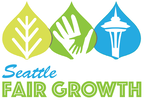Position Paper from Seattle Fair Growth on Homelessness
On January 27, 2017, the All Home point-in-time count in King County found 11, 643 homeless people; of these, 5,485 had no shelter.
- Homelessness has many overlapping causes. The most common reasons given in 2017 for current homelessness were job loss (30%), drug and/or alcohol use (20%), eviction (11%), divorce or separation (9%), illness or medical problems (8%), and domestic violence (6%).
- A recent study, Rent increases linked to homelessness, published in the Journal of Urban Affairs, showed that on average across the country, a $100 increase in median rent corresponded to a 15% increase in homeless population.
- Approximately 55% of individuals experiencing homelessness in 2017 identified as people of color.
- Mental health problems, including substance abuse, are overreported probably underreported and include those who have been homeless for the longest periods of time.
- According to the 2017 Count Us In survey by All Home and Applied Survey Research, 77% of homeless were living in King County when they lost their homes.
Seattle Fair Growth supports the following:
- Stable public funding sources for targeted services and temporary housing.
- Increased investment in permanent very low-income housing. (Temporary housing is not a permanent solution.)
- City accountability/tracking of supportive service providers.
- Subsidized housing for families in crisis, for people with disabilities, for foster children who have aged out of care and for other “street kids,” for elderly on fixed incomes, and for those suffering from mental illnesses, including substance abuse.
- Preservation of “naturally affordable” apartments with low-interest bond-funded maintenance loans to small landlords in exchange for retaining affordability
- Developers should be required to replace 1-for-1 at comparable rent any low-cost housing they remove.
- Housing First policies, low-barrier 24/7 access shelters like the Navigation Center and transitional alternatives.
The HALA Commission, formed by Mayor Murray as a task force to address housing affordability and livability. Unfortunately, its recommendations were biased because, as a top down approach, the majority of committee members had a direct financial interest in increasing housing development. In addition, the report completely neglected livability.
Regardless of the cause of their homelessness or where they first experienced it, homelessness is a highly complex issue which cannot be resolved by a set-it-and-forget-it policy. The city of Seattle must provide a dynamic and passionate response that respects human dignity while preserving the rights of all citizens.
King County Count Point in Time Pit Count
Rent increases linked to homelessness
City of Seattle Homeless Needs Assessment March 2017
2017-Count-Us-In-PIT-Comprehensive-Report.pdf
Seattle’s First Navigation Center Is Not Your Average Shelter, Seattle Met
Community Housing Caucus Report (see especially preservation, financing, and homeless sections)
Contact Us
Subscribe
Join our mailing list today!
